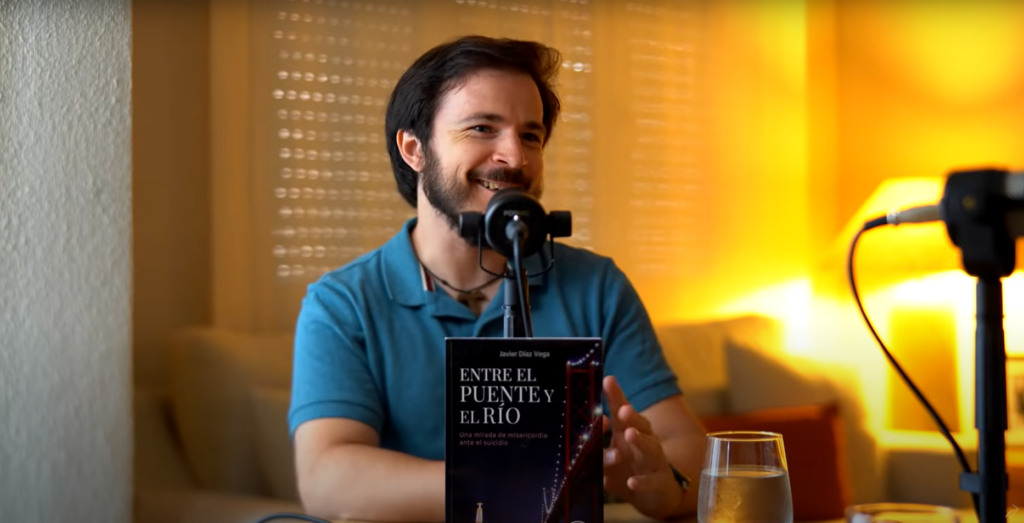In a new episode of the podcast Blanket and FaithIn this episode, communicator Bárbara Bustamante tackles a more delicate and often silenced topic: suicide. Through the testimony of Javier Díaz Vega, son of a woman who took her own life 16 years ago, the episode offers an honest look at pain, guilt, silence and hope, in the light of the Catholic faith.
"I didn't have to be my mother's psychologist...I had to be her son," says Javier, who traces his experience of grief from the heart and from grace. With sensitivity and depth, the podcast invites listeners to reflect on the love that remains, the mercy of God and the importance of accompanying with truth and tenderness those who suffer this type of loss.
The episode also refers to the book Between the bridge and the river (New Eve), written by Xavier himself, and gathers the teachings of the Catechism on suicide, recalling that "God's mercy can reach the person who has taken his own life, by ways known only to Him" (cf. CCC 2283).
The fruits of a courageous testimony
Javier explains that he has witnessed many fruits in these almost 5 years and three editions that Nueva Eva has published with the book: "people who, having gone through a trance similar to mine, have been comforted by reading in other people the pain and hope, or as the Good Friday hymn says, the health born from the wound. This shared consolation makes more sense when not only because of the taboo of suicide, but because of the silence in the face of the suicide floor, which causes loneliness and a deeper fear of misunderstanding. Every person who has approached me through social networks and face-to-face meetings to thank me is a precious fruit and a thanksgiving to God".
The stories of hope he has witnessed help Javier to continue sharing his message. Although "faith helps, we should not propose it as an automatism or as a magic tool that makes us well. We believe in a God who suffers for us and also with us," he adds.
"I remember a meeting in which, talking about suicide bereavement, I had in the front row a woman who was strongly moved, who at the end asked if the bereavement lasted long, that in her environment she was already in a bit of a hurry to be with the same thing every little while. Maybe she will need some other help, but in our suffering, we must seek God, let ourselves be found by Him, not simply to stop suffering, that will be His will, but for such suffering to make sense. For in the Cross of Christ there is room for every suffering embraced by Him".
Hope after suicide
Javier is a psychologist and publicly shares his profound experience with his mother's suicide, offering a hopeful perspective. Javier's experience led him to capture his experiences and learnings in a book, which he describes as "a love letter to my mother." "My mother committed suicide in December 2009. And that was a shock," says Javier, describing the devastating impact of the news. This opening sentence sets the tone for his story, which seeks to destigmatize suicide and offer comfort to those who have experienced it firsthand.
Throughout his grieving process, Javier found a fundamental pillar in his faith. "I always say that faith saved me," he says, noting how his spirituality gave him the strength to face one of the most difficult trials of his life. His testimony is a reminder that, even in the darkest moments, there are sources of comfort and support.
Suicide and catechism
The road to recovery has not been easy. Javier emphasizes that "guilt should not be confused with responsibility," he clarifies, a vital distinction in helping survivors process their feelings without falling into self-condemnation. His message underscores belief in the power of love and mercy. "Love is stronger than death," Javier declares, a phrase that encapsulates the essence of his hope. In his reflection, he also incorporates the perspective of faith, quoting the Catechism of the Catholic Church, "God can give a person occasion to repent." This insight offers a light of hope and understanding, suggesting that divine mercy embraces even the most tragic circumstances.
At a key point in the conversation Javier delves into the perspective of the Catholic Church, quoting a powerful phrase from the CatechismGod, by ways known only to himself, can give a person the opportunity to repent. This quote underscores a fundamental message of hope and mercy. The Church's teaching, while considering suicide a gravely sinful act, also emphasizes the importance of understanding the mitigating factors, such as serious psychological disturbances, anguish or grave fear of hardship, which can significantly diminish a person's moral responsibility. This approach highlights the profound mercy of God, inviting compassionate reflection on the complexity of these tragedies and faith in the infinite goodness of God.
With unwavering conviction, Javier insists on the importance of open conversation: "We must talk about suicide in order to prevent it." His call to action is clear and direct, advocating a dialogue that breaks the silence and encourages help-seeking. Finally, he offers a fundamental piece of advice for those who wish to support someone in bereavement: "The most important thing is to accompany, to be, to listen."








